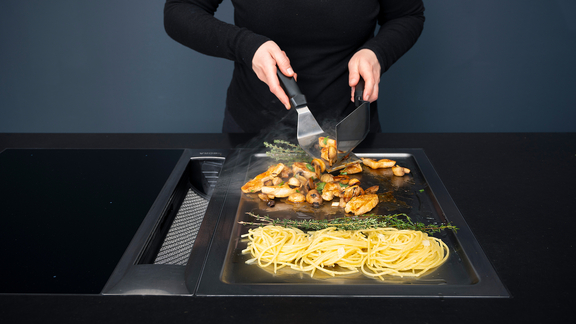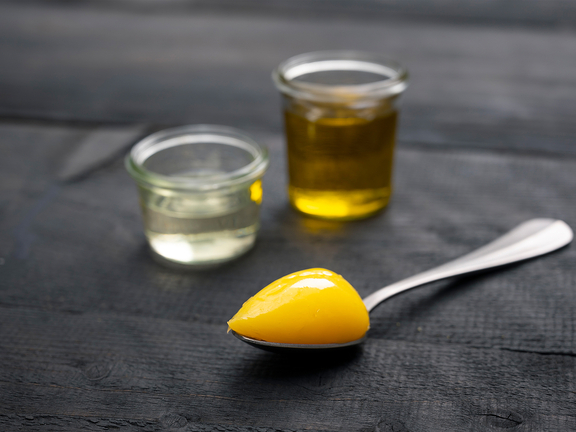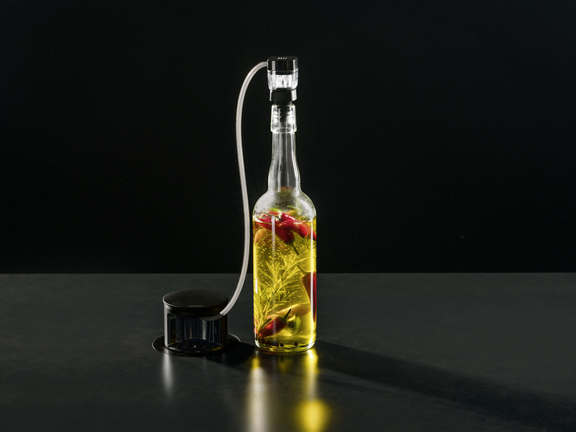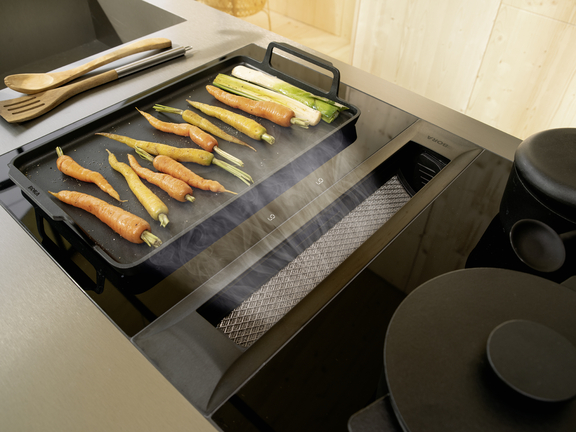

Oil is indispensable for frying healthy and delicious dishes.
Meat, fish, vegetables and the like are given a crispy coating and vegetable oils provide numerous healthy ingredients. Fat also carries flavour and intensifies the aroma of the fried food. But which oil is best for frying and can cold-pressed oil also be used for frying? We at BORA clarify the most important questions.
The roasting is hot: Temperatures of between around 180 and 200 °C are generated in the pan. This heat creates a crispy crust and roasted flavours that give your dishes that certain something. The perfect oil for frying can withstand this heat. If you want to use healthy oil for frying, you should make a well-considered choice: Knowing which oil is suitable for frying and which types work best in the cold kitchen is the key to healthy and delicious dishes.
Switch on the hob, prepare the cookware and you're ready to start frying. But can meat and co. be simply fried in olive oil or should a different fat be used? And which oil is the perfect choice for frying steak
Which oil you use for frying affects the quality of the food. The decisive factor is the so-called smoke point: If the oil starts to smoke, this is an unmistakable sign that the fatty acids are decomposing. Hazardous substances can be produced in the process. This oil is then no longer suitable for frying.

When exactly this smoke point occurs depends primarily on the ingredients of the oil. While some fatty acids are very temperature-resistant and only split at high temperatures, others do so at comparatively low temperatures. The polyunsaturated fatty acids in particular, which are considered healthy, prefer it cool: The higher the proportion of unsaturated fatty acids, the faster the smoke point is reached.
Generally speaking, healthy oils are rich in polyunsaturated fatty acids. They are considered to have a positive influence on cholesterol levels and cell health. Excessive consumption of saturated fatty acids, on the other hand, can be a risk factor for cardiovascular disease and an increase in cholesterol levels.

Omega-3 and omega-6 fatty acids in particular have a reputation as real health boosters. Omega-3 is found in rapeseed, linseed and walnut oil, omega-6 in sunflower oil, among others.
Frying oil is usually refined, i.e. processed. These oils for frying are obtained under the influence of heat and by adding chemicals. This allows more yield to be generatedand refined oils remain heat-stable. The producers then filter the substances used out of the end product. Refined oils are therefore not necessarily unhealthy.
However, the proportion of polyunsaturated fatty acids is reduced and the vitamins and flavours also suffer from the intense heating. Refined oils therefore often have a more neutral flavour than cold-pressedoils.
Good to know: Natural, cold-pressed oils are also labelled "virgin".
You want to use healthy oil for frying and are faced with a large selection of varieties: At what temperatures can the different oils be heated? The table provides information.
| Oil type | Smoke points |
|---|---|
| Avocado oil | 261 °C |
| Refined sunflower oil | 252-254 °C |
| Refined peanut oil | 230 °C |
| Refined rapeseed oil | 190-230 °C |
| Refined sesame oil | 232 °C |
| Refined olive oil | 216 °C |
| Coconut oil | 194 °C |
| Walnut oil | 140 °C |
| Unrefined rapeseed oil | 130-190 °C |
| Unrefined olive oil | 130-175 °C |
| Lin oil | 107 °C |
Short and hot or moderate heat and gentle cooking: Different dishes require different temperatures. This also influences the choice of cooking oil. Which oil is ideal for searing and can cold-pressed oil also be used for frying?

If you use oil for frying carefully, you can enjoy all the health benefits and look forward to excellent flavour. This is what matters:
It doesn't always have to be oil for frying. Many dishes are successful without the use of fat.
Whether refined or cold-pressed oils, they all have storage requirements. To ensure that the oil remains flavourful and fresh for a long time, it is advisable to pay attention to these factors:
Good to know:
Closed oil bottles can be stored for around a year. Opened varieties should be consumed within four to six months.
Only add enough oil to the frying pan to just cover the base. This guarantees that food will be cooked evenly and nicely browned.
To sear meat, all refined oils like rapeseed and sunflower oil are suitable, as is coconut oil.
Olive oil is suitable for the gentle frying of vegetables, as are sunflower and rapeseed oil.
A variety with a neutral flavour like rapeseed oil brings out the flavour of fish dishes perfectly.